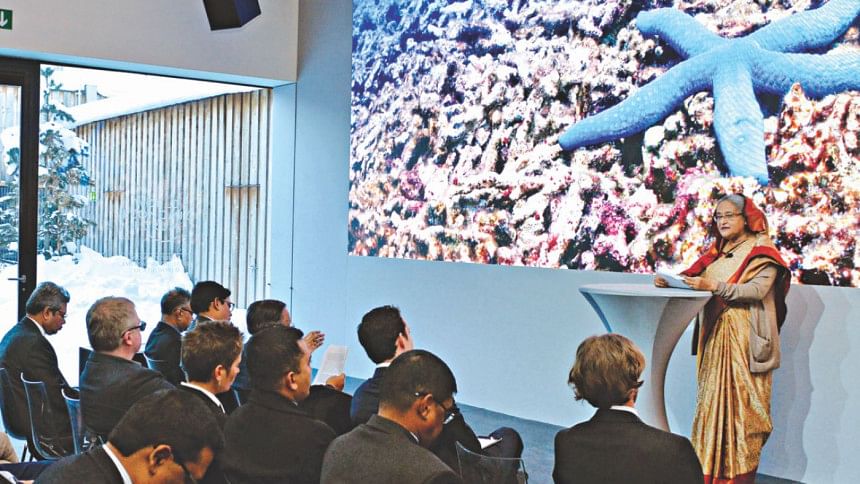World Economic Forum: PM calls for greater water collaboration

Prime Minister Sheikh Hasina has stressed the need for cooperation in freshwater and oceanic resources as an equaliser in addressing inequalities and collaboration on developing and utilising trans-boundary freshwater resources that can make economies great.
"Collaboration on water demands mutual trust and respect among people, states and businesses. We must approach collaboration in terms of securing shared prosperity through shared responsibility, securing win-win outcome and equitable benefit-sharing among all the states and communities," she said.
Describing water as a wealth, the PM yesterday said it can no longer be a free input and infinite resource to production or development.
“Water can no longer be a free input and infinite resource to production or development. Water has to be approached as a most critical global common resource in respect of sustainable development," she said while addressing an event in Davos titled "Worlds Underwater" at Congress Centre of BetaZone.
Terming water technology crucial, Hasina called for ensuring greater access to technologies, support to develop adaptive solutions in improving water use efficiency across the entire chain of production and processing.
She also underscored the need for further efforts to facilitate trans-boundary agreements and joint-governing institutions for all basins and aquifers.
The premier said Bangladesh is trying to source cost-effective solutions and technologies to transform and be responsible partner in global supply chains.
Hasina underlined the need for addressing pollution, declining environmental flows and watershed degradation to secure river basin resources and eco-systems.
"Trans-boundary rivers, wetlands and watersheds are precious wealth in any region. Trans-boundary waters drive economic growth, ensure social development, secure political stability and determine cross-border engagements," she said.
She mentioned that though sharing of trans-boundary river water was often complex two decades back, Bangladesh succeeded in entering into a long-term sharing arrangement with India on the Ganges waters.
Noting that cooperation in freshwater and oceanic resources can serve as an equaliser in addressing inequalities, Hasina said for many coastal and island countries like Bangladesh, the ability to tap and utilise freshwater and marine resources define bulk of people's living existence.
She said private sector's increasing interest in water resources is encouraging.
"Many businesses hold critical knowledge that we need desperately. Any solution will have to be beneficial, affordable and sustainable to the large majority of our poor and marginal people."
Predicting that around 48 percent of Bangladesh population will live in urban areas by 2030, the Prime Minister said, "So, we're focusing more on the sub-national actors. And, we're ready to consider any form of partnership between global capital and knowledge providers and our local and community actors on waters."
SAARC
Hasina has strongly advocated for the continuation of South Asian Association for Regional Cooperation (Saarc), saying it is very much alive.
"The effectiveness of Saarc is still there and, I think, there's a lot to work on it ... Saarc is very much alive," she said.
Hasina was speaking in an interactive session titled "Harnessing Regional Cooperation in South Asia" at the Congress Centre, Aspen 1, in Davos on Tuesday on the sidelines of the World Economic Forum (WEF) Annual Meeting 2017.
Sri Lankan Prime Minister Ranil Wickremesinghe, Indian Minister for Commerce and Industry Nirmala Sitharaman and a Pakistani Civil Society member, among others, took part in the interactive session.
Referring to the postponement of the last Saarc summit in Pakistan, Hasina said, "What happened was that one Saarc summit was postponed. There's no reason for apprehension ... the next Saarc summit could take place in near future."

 For all latest news, follow The Daily Star's Google News channel.
For all latest news, follow The Daily Star's Google News channel. 



Comments